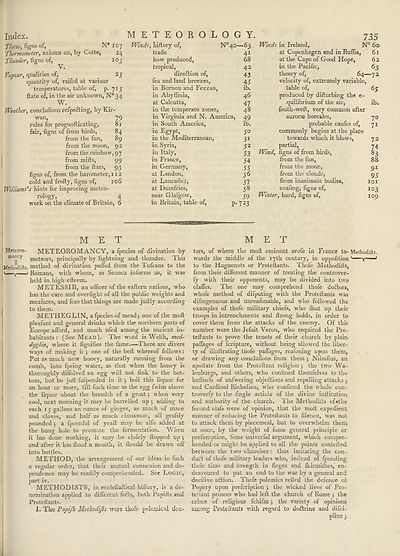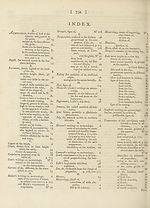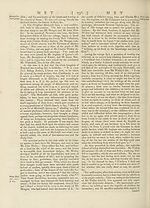Encyclopaedia Britannica, or, a Dictionary of arts, sciences, and miscellaneous literature : enlarged and improved. Illustrated with nearly six hundred engravings > Volume 13, MAT-MIC
(781) Page 735 - MET
Download files
Complete book:
Individual page:
Thumbnail gallery: Grid view | List view

Index.
Thaw, figns of, N* 10 7
Thermometer, axioms on, by Cotte, 24
Thunder, figns of, 10 j
V.
Vapour, qualities of, _ _ 25
quantity of, raifed at various
temperatures, table of, p* 7J5
Hate of, in the air unknown, N°34
W.
Weather, conclufions refpecling, by Kir-
wan, 79
rules for prognofticating, 8 x
fair, figns of from birds, 84
from the fun, 89
from the moon, 92
from the rainbow, 97
from mills, 99
from the ftars, 93
figns of, from the barometer, 112
cold and frofty, figns of, 106
Williams''s hints for improving meteo-
rology, . 4
work on the climate of Britain, 6
METEOROLOGY.
Winds, fiiftory of, N°40—63
trade 41
how produced, 68
tropical, 42
dire£lion of, 43
fea and land breezes, 45
in Bornou and Fezzan, ib.
in Abyffinia, 46
at Calcutta, 47
in the temperate zones, 48
in Virginia and N. America, 49
in South America, ib.
in Egypt, _ 50
in the Mediterranean, 51
in Syria, 52
in Italy, 53
in France, 54
in Germany, 55
at London, 56
at Lancafter, 57
at Dumfries, 58
near Glafgow, 59
in Britain, table of, p. 723
735
Winds in Ireland, N° 60
at Copenhagen and in Ruflia, 6 r
at the Cape of Good Hope, 62
in the Pacific, 63
theory of, 64—7 2
velocity of, extremely variable,
table of, 65
produced by difturbmg the e-
quilibrium of the air, ib.
fouth-weft, very common after
aurorae boreales, 70
probable caufes of, 71
commonly begins at the place
towards which it blows, 72
partial,^ . 74
Wind, figns of from birds, 83
from the fun, 88
from the moon, pi
from the clouds, 93
from inanimate bodies, 101
ceafing, figns of, 103
Winter, hard, figns of, 109
MET
Meteoro- METEOROM ANCY, a fpecies of divination by
ma|jcy meteors, principally by lightning and thunder. This
Method;fts. method of divination palled from the Tufcans to the
'—-v—' Romans, with whom, as Seneca informs us, it was
held in high efteem.
METESSIB, an officer of the eaflern nations, who
has the care and overfight of all the public weights and
meafures, and fees that things are made juilly according
to them.
METHEGLIN, a fpecies of mead 5 one of the mod
pleafant and general drinks which the northern parts of
Europe afford, and much ufed among the ancient in¬
habitants : (See Mead'). The word is Welffi, med-
dyglin, where it fignifies the fame.—There are divers
ways of making it ; one of the bell whereof follows :
Put as much new honey, naturally running from the
comb, into fpring water, as that when the honey is
thoroughly dilfolved an egg will not fink to the bot¬
tom, but be juft fufpended in it 5 boil this liquor for
an hour or more, till fuch time as the egg fvvim above
the liquor about the breadth of a groat; when very
cool, next morning it may be barrelled up 5 adding to
each 15 gallons an ounce of ginger, as much ol mace
and cloves, and half as much cinnamon, all grofsly
pounded ; a fpoonful of yeail may be alfo added at
the bung hole to promote the fermentation. When
it has done working, it may be clofely Hopped up ;
and after it has Hood a month, it Ihould be drawn off
into bottles.
METHOD, the arrangement of our ideas in fuch
a regular order, that their mutual connexion and de¬
pendence may be readily comprehended. See Logic,
part iv.
METHODISTS, in ecclefiallical hillory, is a de¬
nomination applied to different fedts, both Papifts and
Proteftants.
I. The Popijh Methodijls were thofe polemical dcc-
M E T
tors, of whom the moft eminent arofe in France to- Methodifts.
wards the middle of the 17th century, in oppoiition
to the Huguenots or Proteilants. Thofe Methodiffs,
from their different manner of treating the controver-
fy with their opponents, may be divided into two
claffes. The one may comprehend thofe doctors,
whofe method of difputing with the Proteftants was
difingenuous and unreafonable, and who followed the
examples of thofe military chiefs, who Ihut up their
troops in intrenchments and ftrong holds, in order to
cover them from the attacks of the enemy. Of this
number were the Jefuit Veron, who required the Pro¬
teftants to prove the tenets of their church by plain
paffages of feripture, without being allowed the liber¬
ty of illuftrating tiiofe paffages, reafoning upon them,
or drawing any conclufions from them j Nihufius, an
apottate from the Proteftant religion 5 the two Wa~
lenburgs, and others, who confined themfelves to the
bufinefs of anfwering objeftions and repelling attacks j
and Cardinal Richelieu, who confined the whole con ■
troverfy to the fingle article of the divine inftitution
and authority of the church. The Methodiiis of»the
fecund ciafs were of opinion, that the moft expedient
manner of reducing the Proteftants to filence, was not
to attack them by piecemeal, but to overwhelm them
at once, by the weight of fome general principle or
prefumption, fome univerfal argument, which compre¬
hended or might be applied to all the points conteftecl
between the two churches : thus imitating the con¬
duct of thofe military leaders who, inftead of fpending
their time and Urength in fieges and fkirmifhes, en¬
deavoured to put an end to the war by a general and
decifive aftion. Thefe polemics refted the defence of
Popery upon prefeription ; the wicked lives of Pro-
teUant princes who had left the church of Rome j the
crime of religious fchifm ; the variety of opinions
among Proteftants with regard to do&rine and difei-
Thaw, figns of, N* 10 7
Thermometer, axioms on, by Cotte, 24
Thunder, figns of, 10 j
V.
Vapour, qualities of, _ _ 25
quantity of, raifed at various
temperatures, table of, p* 7J5
Hate of, in the air unknown, N°34
W.
Weather, conclufions refpecling, by Kir-
wan, 79
rules for prognofticating, 8 x
fair, figns of from birds, 84
from the fun, 89
from the moon, 92
from the rainbow, 97
from mills, 99
from the ftars, 93
figns of, from the barometer, 112
cold and frofty, figns of, 106
Williams''s hints for improving meteo-
rology, . 4
work on the climate of Britain, 6
METEOROLOGY.
Winds, fiiftory of, N°40—63
trade 41
how produced, 68
tropical, 42
dire£lion of, 43
fea and land breezes, 45
in Bornou and Fezzan, ib.
in Abyffinia, 46
at Calcutta, 47
in the temperate zones, 48
in Virginia and N. America, 49
in South America, ib.
in Egypt, _ 50
in the Mediterranean, 51
in Syria, 52
in Italy, 53
in France, 54
in Germany, 55
at London, 56
at Lancafter, 57
at Dumfries, 58
near Glafgow, 59
in Britain, table of, p. 723
735
Winds in Ireland, N° 60
at Copenhagen and in Ruflia, 6 r
at the Cape of Good Hope, 62
in the Pacific, 63
theory of, 64—7 2
velocity of, extremely variable,
table of, 65
produced by difturbmg the e-
quilibrium of the air, ib.
fouth-weft, very common after
aurorae boreales, 70
probable caufes of, 71
commonly begins at the place
towards which it blows, 72
partial,^ . 74
Wind, figns of from birds, 83
from the fun, 88
from the moon, pi
from the clouds, 93
from inanimate bodies, 101
ceafing, figns of, 103
Winter, hard, figns of, 109
MET
Meteoro- METEOROM ANCY, a fpecies of divination by
ma|jcy meteors, principally by lightning and thunder. This
Method;fts. method of divination palled from the Tufcans to the
'—-v—' Romans, with whom, as Seneca informs us, it was
held in high efteem.
METESSIB, an officer of the eaflern nations, who
has the care and overfight of all the public weights and
meafures, and fees that things are made juilly according
to them.
METHEGLIN, a fpecies of mead 5 one of the mod
pleafant and general drinks which the northern parts of
Europe afford, and much ufed among the ancient in¬
habitants : (See Mead'). The word is Welffi, med-
dyglin, where it fignifies the fame.—There are divers
ways of making it ; one of the bell whereof follows :
Put as much new honey, naturally running from the
comb, into fpring water, as that when the honey is
thoroughly dilfolved an egg will not fink to the bot¬
tom, but be juft fufpended in it 5 boil this liquor for
an hour or more, till fuch time as the egg fvvim above
the liquor about the breadth of a groat; when very
cool, next morning it may be barrelled up 5 adding to
each 15 gallons an ounce of ginger, as much ol mace
and cloves, and half as much cinnamon, all grofsly
pounded ; a fpoonful of yeail may be alfo added at
the bung hole to promote the fermentation. When
it has done working, it may be clofely Hopped up ;
and after it has Hood a month, it Ihould be drawn off
into bottles.
METHOD, the arrangement of our ideas in fuch
a regular order, that their mutual connexion and de¬
pendence may be readily comprehended. See Logic,
part iv.
METHODISTS, in ecclefiallical hillory, is a de¬
nomination applied to different fedts, both Papifts and
Proteftants.
I. The Popijh Methodijls were thofe polemical dcc-
M E T
tors, of whom the moft eminent arofe in France to- Methodifts.
wards the middle of the 17th century, in oppoiition
to the Huguenots or Proteilants. Thofe Methodiffs,
from their different manner of treating the controver-
fy with their opponents, may be divided into two
claffes. The one may comprehend thofe doctors,
whofe method of difputing with the Proteftants was
difingenuous and unreafonable, and who followed the
examples of thofe military chiefs, who Ihut up their
troops in intrenchments and ftrong holds, in order to
cover them from the attacks of the enemy. Of this
number were the Jefuit Veron, who required the Pro¬
teftants to prove the tenets of their church by plain
paffages of feripture, without being allowed the liber¬
ty of illuftrating tiiofe paffages, reafoning upon them,
or drawing any conclufions from them j Nihufius, an
apottate from the Proteftant religion 5 the two Wa~
lenburgs, and others, who confined themfelves to the
bufinefs of anfwering objeftions and repelling attacks j
and Cardinal Richelieu, who confined the whole con ■
troverfy to the fingle article of the divine inftitution
and authority of the church. The Methodiiis of»the
fecund ciafs were of opinion, that the moft expedient
manner of reducing the Proteftants to filence, was not
to attack them by piecemeal, but to overwhelm them
at once, by the weight of fome general principle or
prefumption, fome univerfal argument, which compre¬
hended or might be applied to all the points conteftecl
between the two churches : thus imitating the con¬
duct of thofe military leaders who, inftead of fpending
their time and Urength in fieges and fkirmifhes, en¬
deavoured to put an end to the war by a general and
decifive aftion. Thefe polemics refted the defence of
Popery upon prefeription ; the wicked lives of Pro-
teUant princes who had left the church of Rome j the
crime of religious fchifm ; the variety of opinions
among Proteftants with regard to do&rine and difei-
Set display mode to:
![]() Universal Viewer |
Universal Viewer | ![]() Mirador |
Large image | Transcription
Mirador |
Large image | Transcription
Images and transcriptions on this page, including medium image downloads, may be used under the Creative Commons Attribution 4.0 International Licence unless otherwise stated. ![]()
| Permanent URL | https://digital.nls.uk/192694203 |
|---|
| Attribution and copyright: |
|
|---|
| Description | Ten editions of 'Encyclopaedia Britannica', issued from 1768-1903, in 231 volumes. Originally issued in 100 weekly parts (3 volumes) between 1768 and 1771 by publishers: Colin Macfarquhar and Andrew Bell (Edinburgh); editor: William Smellie: engraver: Andrew Bell. Expanded editions in the 19th century featured more volumes and contributions from leading experts in their fields. Managed and published in Edinburgh up to the 9th edition (25 volumes, from 1875-1889); the 10th edition (1902-1903) re-issued the 9th edition, with 11 supplementary volumes. |
|---|---|
| Additional NLS resources: |
|

